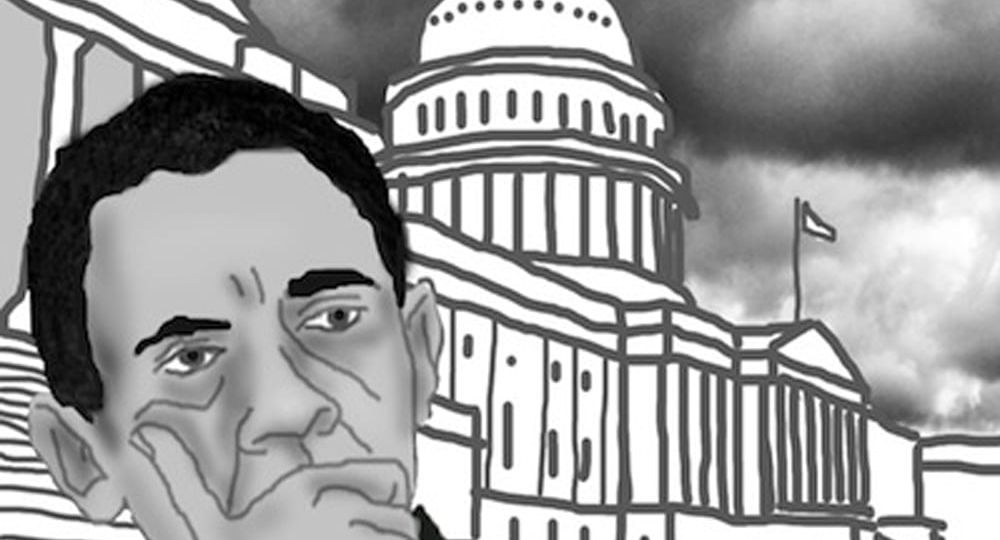
Early last week, President Obama held a press conference to announce, well, nothing. Obama commented on the rising number of inmates who are on hunger strikes at the military prison in Guantanamo Bay Gitmo. He announced another attempt to close the controversial prison. This move was surprising because Obama promised to close the 12-year-old prison while campaigning for his first term.
However, the president should not shoulder the blame on this issue because it is really a problem with Congress. Controversy surrounding Gitmo touches on a deeper issue of congressional responsibility, mainly the seemingly disproportionate power of the legislative branch and, consequently, the disproportionate blame on the executive.
In George W. Bush’s last year in office, he made a surprising promise: he promised to close Gitmo before the end of his term. Obama made the same promise on the campaign trail. One would think that the commander-in-chief would have jurisdiction over a military prison, but that is not the case.
Congressional demagogues from both sides of the aisle blocked the funding of prisoner transportation after Obama rolled out plans to shut down the camp within one year. New detainees stopped coming to Gitmo and the administration drew up plans for detainee transfer to foreign countries. Without funds to transport the prisoners, however, they stayed put. Gitmo is now in limbo: It is not quite closed, and prisoners still cannot leave.
Unfortunately, Obama has taken most of the flak on this issue. The media should be harpooning Senators Lindsey Graham and John McCain, the men who fought for Gitmo to remain open. Focusing on multiple people is harder, though, because they could share responsibility or provide different perspectives on the issue. The president is one person that everyone can identify with, and therefore criticism flows freely upon him.
Accountability in the national system is complex and covers a range of issues. For example, the sequester, which took effect last month, was designed to force both parties to the bargaining table to produce a budget. That did not happen. Citizens should blame Republicans in Congress for this failure, but news pundits still consider it a “failure of leadership” on Obama’s part.
Power in politics is derived from what Teddy Roosevelt called the “bully pulpit.” While the president interacts with the media on a daily basis, members of Congress can wait for the perfect time to usurp the pulpit and push an issue. Last week, CIA officials announced that chemical weapons had been used in Syria. In order to please members of Congress, Obama implied earlier this year that chemical weapons would necessitate US intervention. Now that they have reportedly been used, Obama is trying to verify the reports and take slow steps to alternate forms of aid so that intervention is not necessary. Meanwhile, Republican Senators can have a field day with the press by attacking Obama.
Gun control offered another instance of congressional power gone wrong. Obama promised immediate action following the Sandy Hook shootings and issued several executive orders, while legislators in the Senate advocated for stronger background checks. These proposed background checks, which garnered over 90 percent approval nationwide, were filibustered to death. The minority that stopped the bill included Senators from small states like Wyoming and Alaska, whose population together is less than the capital of a larger state such as California. Yet these senators held strong influence on the issue.
We need to stop blaming the president for national problems. Currently, our problems hinge on a few self-righteous demagogues in Congress. We have ways to push greater congressional accountability.
Media outlets could cast greater scrutiny on the votes and moves of individual Representatives and Senators. In the long run, legislators could introduce more comprehensive measures. Amendments to the Constitution could be passed allowing for recall elections on all members of Congress or barring congressmen from running for re-election. Right now, we can all start critiquing members of Congress and what they are doing to the nation.
Seth Ellingson ’15 ellingss@stolaf.edu is from Powder Springs, Ga. He majors in political science and Russian.
Graphic Credit: Alli Livingston/Manitou Messenger

